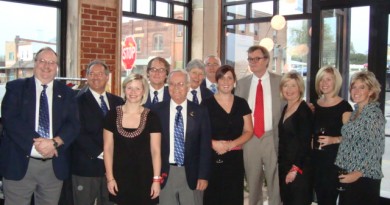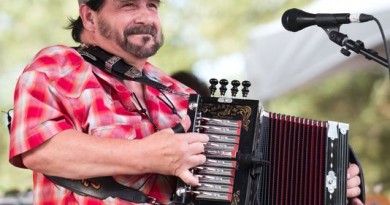Slovenians in Minnesota honored
Several Iron Range residents of Slovenian background were recently recognized for their contributions to preserving their heritage. Slovenian Union Branch 35 had chosen Dec. 6 to honor Slovenian Americans in Minnesota, coinciding with a Polka Mass and Slovenian dinner at St. Joseph’s Catholic Church in Gilbert.
Those honored were Leopolda “Le” Schutte of Gilbert, Pat Sayovitz Koski of Ely, Albin Zaverl of Virginia, Bernard “Bernie” Barich of Bear Island Lake, John Barich of Ely, George Rosandich of Aurora, Mary Veronick of Gilbert, Rosemary Ribich of Bass Lake, Nick Vukelich of Gilbert, and the late Frank Frol of Virginia.
• Leopolda Schutte, born in Prebacevo, Slovenia, in 1936, and her parents lived under German Nazi occupation during World War II, and in 1945, when the war ended, the family moved to Austria to escape the Communists who had taken over the country. The family had expected to return to Slovenia as soon as conditions were deemed to be safe.
“Unfortunately or fortunately, that time never came,” Schutte said in a biography prepared for the ceremony. “The refugee camp was under the direction of British military, but Slovenians established their own schools, medical services, churches and various civic functions. I attended school from first to sixth grade. Luckily, after five years in the refugee camp America accepted us as immigrants. We arrived in America in 1949. At that time it was difficult for my father to get a job. But with the help of our wonderful sponsors, Mr. and Mrs. Martin Stephon, as well as Father Schweiger, Father Dolsina, and many good people of Elcor, and surrounding communities we were able to manage until our father found work. New life in America gave us many wonderful opportunities, but it also posed some challenges. For starters, none of us knew any English. I started school in Gilbert. They put me in the second grade to learn English, but I was 13 years old. After a month, I was transferred into the sixth grade, and by the end of the year I also completed the seventh grade. I continued my schooling until the end of ninth grade. At that time, I started a job at Cluett Peabody Shirt Factory in Gilbert.”
She later married Vince Ferkul, moved to Cleveland, and was widowed with four children at 25. She returned to Gilbert, married Rudy Schutte, now deceased, and had another child. She and her sister purchased Koshar’s Sausage Kitchen, now owned by son Willy Ferkul.
• Mary Mazar Veronick of Gilbert was born in 1933 to a Croatian immigrant father and an American-born Dalmatian descent mother, lived on a farm near Nashwauk, and graduated from Greenway High School in Coleraine.
She married Cliff Veronick, a teacher and musician, now deceased.
Veronick, mother of four, began playing the organ at a Catholic church in Nisswa, and when the family moved to Florida, she sang in a church choir and worked on plays.
The Veronicks returned to the Range in the early 1970s and she joined the Northern Lights amateur theater group in Virgina. A Saturday evening mass was initiated at St. Joseph’s, and Veronick made her organ playing debut and has continued in some capacity ever since.
“Her impact at our spiritual events, whether joyous or sad, can’t be estimated,” it was noted in honoring her.
• George Rosandich of rural Aurora has been repairing button box accordions and piano key accordions for years, as well as playing the button box for years. He also is the organizer of many polka events.
“I’ve repaired and tuned about 1,200 accordions of all types in the last 24 years,” he wrote is his biography for the Slovenian event.
In 1996 he bought parts and accordions from the estates of John Kucher in Michigan, Podboy in Illinois, and Karpec in Wisconsin and started repairing and tuning piano key accordions and chromatics. He has worked on 50 to 70 accordions each year for patrons across the country and continues to entertain with traditional Slovenian music at parties and nursing homes.
• Pat Sayovitz Koski of Ely is proud to be 100 percent Slovenian, from grandparents Chelesnik, Fircik, Sayovitz (Sajovic), and Burger.
Her passion is Slovenian music and practicing Slovenian traditions, having sung with Ely’s Slovenian Chorus since its inception and singing solos and duets with the director. She sings in the St. Anthony’s Church choir, and is a cantor and participated in a Slovenian Song Fest with a family of singers from Slovenia.
Koski was honored with an Ely Community Service Award in 2011. She is the current president of Slovenian Union of America Branch 23. Her son, Mike, is a member of Twin Cities Slovenians.
• Albin Zaverl of Virginia, born in Ely in 1920 to Slovenian immigrant parents, is still involved in painting at age 95.
His home is filled with his paintings in bright acrylics, pastels, and watercolors of Slovenia and Slovenian farmers, as well as paintings of hedgehog figures representing a symbol of Austria.
A collection of his work called Old Country Memories is dedicated to the Slovenian immigrants and was displayed in 2014 at the Slovenian Embassy in Washington, DC. His work was viewed by an estimated 40,000 visitors, and the Slovenian ambassador visited at Zaverl’s home.
• Rosemary Sertich Ribich was born to a Croatian immigrant father and Slovenian immigrant mother and grew up in Virginia.
She married Robert Ribich, whose grandmother organized the Biwabik branch of the Slovenian Women’s Union. Ribich joined the Biwabik Slovenian Women’s Union in 1982 and was honored as member of the year in 2002, and in 2007 became Minnesota regional president.
The Biwabik SWUA merged with Aurora Branch 35, a merger made necessary by aging membership. After Ribich attended the national convention in Illinois several years ago, her goal was to increase membership. Children of several Iron Range SWUA members live in the Twin Cities area and Ribich’s hope is to encourage them to become involved in preserving Slovenian heritage.
• Brothers Bernie and John Barich have been performing Slovenian music for several years as the Barich Brothers, Bernie playing the accordion and John playing the bass guitar.
Also in the group were the late George Barich on banjo and the late Mike Weinzierl, who played banjo after George died.
The Bariches play the old-country songs their mother sang as she prepared Sunday dinner. The Bariches have recorded CDs to preserve the music their ancestors brought from Slovenia to America.
On one recording are these words: “To forget the old songs, customs and language would truly be a loss. We present this tape to our families with the hope they will enjoy our music.”




